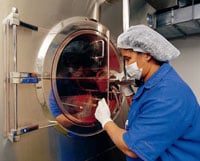
Top stories

Marketing & MediaWarner Bros. was “nice to have” but not at any price, says Netflix
Karabo Ledwaba 8 hours




Logistics & TransportMaersk reroutes sailings around Africa amid Red Sea constraints
Louise Rasmussen 1 hour

More news



















According to Vital Health Foods managing director George Grieve, "Consumers need to be asking questions about their complementary medicines, like what precautions should I be taking when buying complementary medicine. This kind of information is available from manufacturers you can trust."
Still, many products that fall into the complementary and alternative medicine (CAMs) space may not offer important detail, such as the level of toxicity of the ingredients used in making the drug, or how that drug reacts when mixed with another, conventional medicine. Part of the problem is the broad spectrum of products that classify as CAM products. Essentially any medicines that contain herbs, vitamins and minerals, including nutritional supplements, as well as homeopathic alternatives are categorised under the CAM term. Some experts reckon that could include up to 60 000 products found on the shelves of pharmacies and other stores across the country.
It's also a market that's enjoying strong growth in South Africa. Statistics from Vital Health Foods puts the annual size of the market just for vitamins and supplements at nearly R800 million in 2009, a jump of more than 20% on the previous year. The World Health Organisation (WHO) classifies the use of complementary and traditional medicine as 'high' in South Africa - that's the highest classification the WHO has, and is considerably higher than SA's southern African peers such as Namibia and Botswana.
The reason? Pundits say as South Africans live increasingly 'Westernised' lifestyles, they also start to suffer from this demanding standard of living - which results in a poor diet, high stress levels and lack of sleep. Complementary medicines serve as the ideal buffer to offset this way of life, and allow consumers the opportunity to self-medicate, to try to better control their own health, or to simply avoid the side effects often attributed to conventional medicine.

According to Grieve, however, the increase in demand has opened up opportunities for some unregulated producers "to make a quick buck out of this" and current regulations don't seem to be helping. Regulation of CAMs ultimately falls to the Medicines Control Council (MCC), but according to chairman of the MCC, Professor Peter Eagles, regulations for the registration of CAMS are still being finalised. "In the interim, quality is addressed on a case-by-case basis. Where complaints are lodged with the MCC on products, these will be investigated." As a result, products in the industry aren't being checked, until they actually cause a physical problem for a consumer who is willing to take the matter further, and while CAM products need to be registered with the MCC, this merely includes the signing of some paperwork.
What's more, nutritional supplements are currently only covered by the Food Law of the country - which merely requires meeting basic hygienic standards, and very little else. A study published in the SA Medical Journal last year, conducted by Roy Jobson of Rhodes University found that complementary medicines in the country don't need to provide independent evidence of their quality. Jobson says, "This essentially means that none of the unregistered complementary medicines on the market have had any independent South African regulatory validation of their quality. These medicines could contain only inactive ingredients, or a variety of toxins - from heavy metals to bacterial toxins."
The result? Jobson says, "Many consumers are putting themselves at risk as a result of inadequate information being made available about complementary medicines. (The lack of regulation) may yet be shown to have severe consequences for the health of our citizens."
So what kind of regulation is needed in the complementary medicines space? According to Jobson, complementary medicines need to be subjected to the same analysis that conventional medicines undergo. "Certificates of analysis should be available on each and every batch." Eagles says, "In general, manufacturers of orthodox medicines (non-CAMs) are audited regularly on a three-year cycle. Once the regulations for CAMs are in place, manufacturers will also be audited."

Until then, however, consumers need to empower themselves to know whether the products they're using have been tested. Vital Health Foods' pharmaceutical-quality production facility, for example, is registered as a pharmaceutical company - and as such, undergoes strict testing. Grieve says, "We have to by law test every batch of every ingredient for purity and safety. We also voluntarily test the finished product. This eliminates the risk of unwanted, unsafe and unidentified components being present in the finished product." Vital products are accompanied by a 'Good Manufacturing Practice (cGMP)' stamp, which guarantees the shelf-life of the product according to strict international standards.
Vital Health Foods is also reputedly the only South African supplements manufacturer that is accredited by the Australian Therapeutic Goods Administration. This ensures the quality, safety and efficacy of medicines supplied in Australia - by testing the toxicity of ingredients, the likely side-effects and, among other things, what adverse effects could occur if the product is used incorrectly. Vital Health Foods' production facility also this year gained British Retail Consortium (BRC) accreditation.
Grieve suggests that trusted pharmacists should be able to offer safety assurances of the products they sell. However, if there are any concerns about the product, he recommends consumers speak to an expert. Vital Health Foods offers a toll free helpline, which is manned by a dietician and a phytotherapist (herbal doctor). "If people have questions about whether they're using the right supplement, also how that supplement may react when used with other medication, they should call 0800 223311."
According to Grieve, the introduction of the Consumer Protection Act in April 2011 should also help consumers. "The Act will have a huge impact. Manufacturers won't be able to play innocent anymore. Now you'll have to provide proof of your products, especially when the consumer demands it."
Eagles believes South Africa's new regulations for the registration of CAMs will be among the best in the world when they're finally introduced. "Of course as always, implementation of any system, or of the regulations in this case, will be challenging." However, for now, South Africans should use only trusted suppliers. Eagles says, "The regulations will have to be finalised and implemented before we can have confidence in all products being sold in the country."
According to Grieve, "Vital Health Foods is part of the healthcare industry. As a result, we want to highlight that by choice, we voluntarily put our products under strict safety tests. That ensures our products contain what they promise."